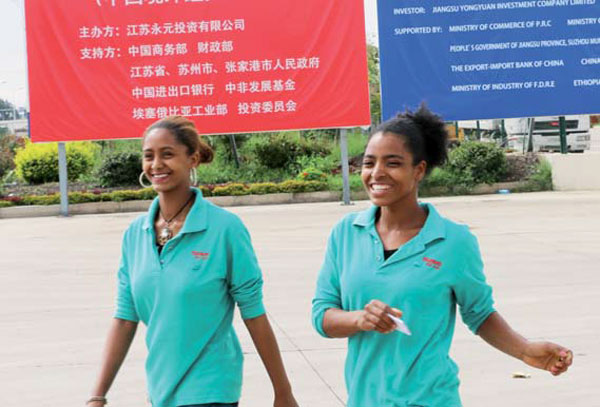

Two workers from Huajian Shoes pass by a signboard of the Eastern Industry Zone, the first industrial zone in Ethiopia. Chen Weihua / China Daily
In the past, poor Ethiopian infrastructure has put off many potential foreign investors.
For example, the 37-km trip from Addis Ababa to the zone might have taken as long as 90 minutes on the earlier single lane highway. Up to 20 power cuts a day might also have proved too much of a headache.
Jiao says Chinese Premier Li Keqiang's much-publicized visit to the zone in May, accompanied by Ethiopian Prime Minister Hailemariam Desalegn, gave it a huge boost.
Since then, the number of enquiries from possible Chinese tenants has surged, convincing the owners to consider further expansion.
Jiao says he is unconcerned by competition from other industry zones built by private companies.
Huajian Shoes, for instance, has already secured a further site in Lafto, southwest of the capital, on which it plans to develop a light industry city of its own to include industrial, residential, hotel and shopping facilities.
However, he is concerned that some of the subsidies and benefits being offered by the government to other Ethiopian industrial site developers are not being made available to Chinese counterparts.
He also says that because the zone is a land developer, it is not eligible for the promised tax holidays that are offered to other foreign manufacturing companies.
Jiao, 58, has been doing business in Ethiopia since 1999, when he worked for a textile group based in Tangshan, in North China's Hebei province.
Since joining the zone in 2008, he says he has hosted many Ethiopian officials wanting to learn more about how to operate an efficient industrial zone.
The Ethiopian Investment Agency, established in 1992 to promote private investment, primarily foreign direct investment, was recently upgraded to a commission and is making strenuous efforts to create a more favorable environment for foreign investors.
Nearby, the government-built Bole Lemi Industrial Zone has already attracted 20 foreign tenants, including the shoemaker Gorge Shoe Corp from Taiwan, and a new state-owned site is now being planned in Kilinto, south of there.
A World Bank survey released in November 2012 on Chinese FDI in Ethiopia highlighted six major challenges of doing business in the country: inadequate trade regulations, low customs clearance efficiency, foreign exchange risk, inconsistent tax regime, lack of skilled labor and lack of access to local finance.
Despite all the challenges, the World Bank survey of 69 Chinese companies doing business in Ethiopia finds that most Chinese investors have expressed optimism in the Ethiopia markets, including Jiangsu Qiyuan Group.
The Ethiopian government still exercises tight control over foreign currency and its own currency, known as birr, has depreciated substantially in the past decade.
A report by global business consultancy Deloitte called Ethiopia, A Growth Miracle, also pointed similar challenges facing the country in attracting foreign investment.
Copyright ©1999-2018
Chinanews.com. All rights reserved.
Reproduction in whole or in part without permission is prohibited.